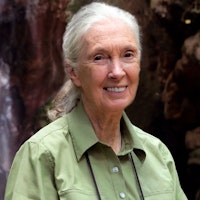We are part of the natural world, and we need to understand our place in it and learn to live in harmony with nature.
We are part of the natural world, and we need to understand our place in it and learn to live in harmony with nature.
Jane Goodall

Part of the Natural World
Topic: The Natural World
We are part of the natural world, and we need to understand our place in it and learn to live in harmony with nature. Science can help us to do this, but it is also important to have a spiritual connection to the natural world. When we feel love and respect for nature, we are less likely to harm it.
Jane Goodall was born on April 3, 1934, in London, England. As a young girl, she was fascinated by animals and nature, which led her to dream of traveling to Africa to observe them in their natural habitats. With limited financial resources but an unwavering determination, she eventually saved enough to make her first journey to Kenya in 1957. There, she met famed anthropologist Louis Leakey, who recognized her potential and offered her the opportunity to study chimpanzees in Gombe Stream National Park in Tanzania. Though she lacked a formal scientific education at the time, her keen observational skills and genuine respect for the natural world laid the groundwork for a revolutionary understanding of animal behavior.
Goodall's work in Gombe radically changed the scientific community's understanding of chimpanzees and, by extension, human beings. Over the years, she discovered that chimpanzees used tools, had complex social structures, and exhibited behaviors previously thought to be uniquely human, such as empathy and even warfare. Her findings were initially met with skepticism, but as the evidence grew, so did her reputation. Goodall earned her Ph.D. in ethology from Cambridge University in 1965, becoming one of the few people to earn a doctorate without first obtaining a bachelor's degree.
Over the ensuing decades, Jane Goodall has become a global advocate for conservation and animal welfare, founding the Jane Goodall Institute in 1977. The organization focuses on conservation, education, and research and has initiated various community-centered conservation programs across Africa. She has authored numerous books, delivered lectures worldwide, and received many awards and honors for her work, including being named a UN Messenger of Peace. Through her ongoing efforts, she seeks to inspire a new generation of individuals to treat the natural world with the same profound respect and deep sense of interconnectedness that has guided her own remarkable life.
Goodall, Jane. "The Importance of Loving and Understanding the Natural World." Templeton Prize Foundation, 31 May 2021. Web. 16 Sept. 2023.

Jane Goodall
Theme: Natural World

About Jane Goodall’s quote [Commentary]
Jane Goodall’s statement, “We are part of the natural world, and we need to understand our place in it and learn to live in harmony with nature,” brings attention to a relationship often overlooked. She begins with a clear recognition: humans belong within the natural world, not above or outside it. This understanding leads directly to a responsibility—to “learn to live in harmony” with the Earth. Her sequence of thought moves from belonging to awareness to practice. Rather than dominance or control, she emphasizes alignment—an invitation to live with, rather than over, the world around us.
In the context passage, Jane Goodall continues: “Science can help us to do this, but it is also important to have a spiritual connection to the natural world.” She does not separate scientific understanding from spiritual connection; instead, she shows how they work together. Science offers knowledge; spiritual connection brings care. It is through “love and respect for nature” that we become less likely to cause harm. For Goodall, understanding and reverence are not separate values. One leads naturally into the other.
Her closing words, “When we feel love and respect for nature, we are less likely to harm it,” center the ethical core of her message. Love here is not sentiment but protection. Respect, similarly, is not distant admiration but a grounded way of relating. By affirming that we are part of the natural world, and by linking knowledge with spiritual connection, Jane Goodall outlines a clear path forward: not only to understand our place, but to live in such a way that honors that place through harmony, care, and restraint.
Jane Goodall, It will take hope, inspiration and action to save the earth [Excerpt]
“The good news is that there are groups of people tackling every single one of the problems we face today. Every single one.
The sad thing is that so often, people work in silos. They are concentrating only on solving their problem. For instance, imagine that we are a group fighting the closure of a coal mine because of all the carbon dioxide (CO2) emissions. We’ve closed it but haven’t been thinking holistically; we haven’t been thinking of all the people who will lose jobs and how we are plunging them into deep poverty. But if we start thinking holistically from the beginning, we can find ways of helping all these people who lose their jobs to make a living so that we get a win-win-win situation.
We need to collaborate and take action now.”
—Goodall, Jane. [https://www.dailygood.org/story/3210/it-will-take-hope-inspiration-and-action-to-save-the-earth-jane-goodall/]. See article link in Resources.
Additional Jane Goodall Quotes
Resources
Related Quotes
Copyright © 2017 – 2026 LuminaryQuotes.com About Us